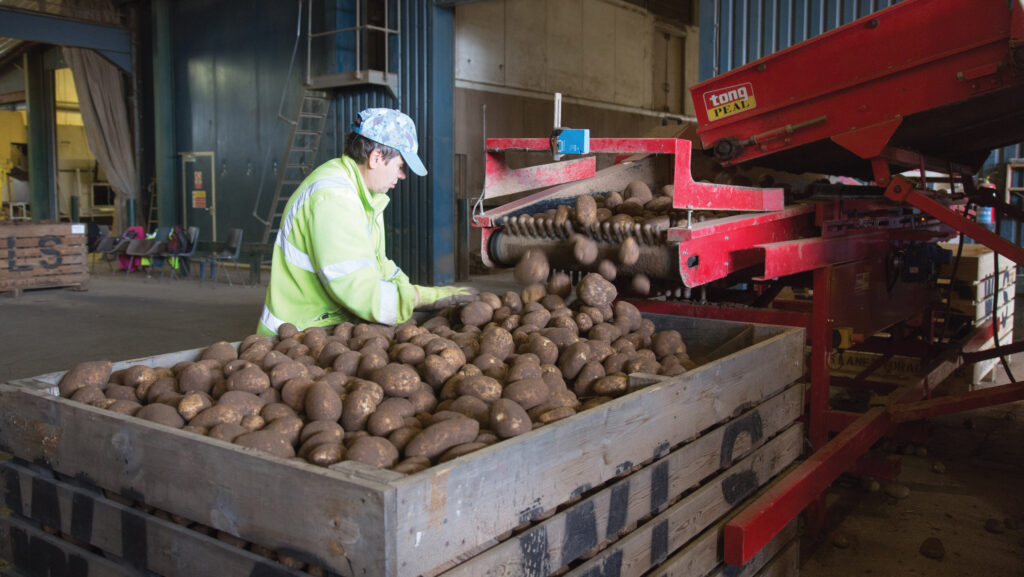Hort and potato growers discuss rising costs with minister
 © Tim Scrivener
© Tim Scrivener UK growers have faced a plethora of challenges in recent years, leading to a reduced planted area and an increased reliance on imports.
Rising production costs, limited access to labour, a lack of crop protection products, and poor contractual relationships within the supply chain have all played a part in the sector’s demise.
Defra figures show the UK planted area for fruit and vegetables has been in decline for several years and stood at 134,000ha in 2023, down by 20,000ha on 2020 levels.
Planted areas for brassicas, legumes, and root crops were all lower on the year in 2023 and industry estimates suggest 2024 was a similarly challenging time for the sector.
See also: UK potato prices hold firm as demand picks up
Domestic production of vegetables as a percentage of total supply stood at just over 50% in 2023, down from 87% 30 years ago, while home production of fruit accounted for just 16% of total supply.
The number of growers is also in decline and, despite higher farmgate potato prices in recent years, there are fewer than 5,000 potato growers left in the UK, a drop of more than 2,000 in the past two decades.
The NFU Horticulture and Potatoes Board raised many of these concerns with Defra farming minister Daniel Zeichner on 18 February and discussed what future support may be available for the sector.
Tim Rooke, NFU Potato Policy Group chair, said the UK doesn’t grow enough potatoes and imports approximately 1m tonnes of frozen chips a year, because the risk against return of growing potatoes is astronomically high.
“To grow potatoes, it costs between £6,000/ha and £7,000/ha, compared with cereals which is just under £1,000/ha.”
Mr Rooke said much of this cost was associated with plant protection and many products were no longer available and often yields were down on farm as a result of disease.
Mr Zeichner acknowledged that it was really hard for growers who are being asked to produce more when the tools available to them are being reduced.
He said: “I’m very keen to make sure people producing here are not disadvantaged and there is a level playing field.”
The numbers
134,000
UK planted area for fruit and vegetables in 2023 (hectares)
£6,000
Cost of growing potatoes (£/ha)
16%
Domestic production of fruit as percentage of total UK supply
Labour supplies
Cost and uncertainty over future access to seasonal labour were both raised as issues which have encouraged some growers to cut back production.
Stephen Shields, technical director at vegetable growers and suppliers Huntapac Produce, said with increased national minimum wages and higher national insurance costs labour was accounting for anywhere between 40% to 70% of total costs of production.
Mr Zeichner said: “We have already ensured that growers have adequate seasonal labour for 2025, which is vital in helping growers manage seasonal peaks, and bringing the range of top quality fresh produce to market that we rely on.”
He suggested an announcement on the future of the Seasonal Worker Scheme would be made in the coming months.
“We are very aware that the returns for producers at the moment are in many cases very low. We don’t think that’s a sustainable way for the sector to carry on into the future.”
“We want to have a conversation about how we can make farming more profitable and more sustainable, both financially and environmentally.”
Growth strategy
The NFU has launched a revised growth strategy for the horticulture and potato sectors calling on government to improve access to labour, crop protection products and investment opportunities as well as improve the relationship between producers and retailers.
NFU Horticulture and Potatoes Board chair Martin Emmett said: “Horticulture is a sector where industry, the supply chain, and government all agree there is significant potential for growth in the UK.
“However, since the election, progress has stalled, and growers urgently need clarity on crucial policies such as the Seasonal Worker Scheme, the Fruit & Veg Aid Scheme, and the output from last year’s Supply Chain Fairness Review.
“For the UK to meet its food security and environmental targets, the government must act now to support the growth of domestic horticulture.”
Mr Zeichner acknowledged that more food could be grown here in the UK and said the government’s goal was to make sure we can sustain our levels of food production while at the same time look after the environment.
He said: “Making sure that we produce good quality, affordable, environmentally sustainable food in our country is a goal I think we can all share.”
